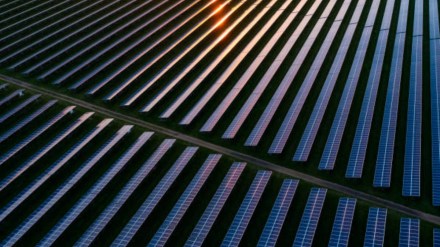The government on Monday issued an order to include solar cells under the ambit of Approved List of Models and Manufacturers (ALMM) effective from June 1, 2026, a measure aimed to boost domestic manufacturing of solar cells and reduce dependency on Chinese imports.
ALMM is a list of the models and manufacturers from which solar project developers are required to buy equipment from. Currently, ALMM has been imposed for solar modules. However, in the past few years, implementation of ALMM for solar modules has faced several challenges primarily due to the reluctance from the industry.
The new rule extends the norm to a more primary level of manufacturing of solar equipment, which would mean increased domestic value addition.
“With installed capacity of solar PV cells in the country expected to increase substantially in next year, it has been proposed to issue List-II of solar PV cells under ALMM, which shall be effective from 1st June 2026,” the ministry of new and renewable energy said in its order.
It noted that starting June 1, 2026 onwards, only such solar PV modules will remain in ALMM List-1 (for solar PV modules) which are using solar PV cells from ALMM List-II (for solar PV cells) and solar PV module manufacturers who fail to comply to this condition, will be liable to be delisted from ALMM List-1.
However, after May 31, 2026, the ministry will come out with a separate ALMM list for solar PV modules which are enlisted in ALMM but do not use solar PV cells from the list for solar PV cells. The list would be applicable for exempted projects.
The ministry of new and renewable energy had earlier released draft amendments to the ALMM order for implementation of ALMM for Solar PV cells proposing to issue List-II of solar PV cells under the list, which shall be effective from April 1, 2026. After holding public consultations and industry feedback, the government extended the implementation date for the list to June 2026.
The ALMM order released by the ministry back in 2019 had provision for List-I, specifying models and manufacturers of Solar PV modules and List-II, specifying models and manufacturers of Solar PV cells, till date.
In the calendar year 2023, the country added 20.8 gigawatt (GW) of solar module manufacturing capacity and 3.2 GW of solar cell capacity, according to a report by Mercom India Research. Imports of solar cells in 2023 stood at 15.6 GW, up 169% from 5.8 GW in 2022.
The Mercom report forecasts India’s module manufacturing capacity to exceed 150 GW by 2026 and that of solar cells to reach 75 GW from the current annual capacity of 5.8 GW as of December 2023.
India accounts for over 50% of the cell exports from China, and given the over-supply of the Chinese solar supply chain the imported cells are being dumped at prices below cost of production to clear inventory.
“While it’s true that imported cells have had a cost advantage due to sheer scale, that equation is about to change. As our domestic players ramp up, supported by the right policy framework and investments in innovation, we’ll see costs taper down, enabling us to compete head-to-head with global suppliers,” Amit Paithankar, CEO, Waaree Energies Ltd had earlier said.
Sujoy Ghosh, Vice President & Country Managing Director – India, First Solar had also said that India has the potential to counter China’s strategic dominance of global solar value chains, and it cannot achieve this potential by relying on Chinese supply chains for critical components such as cells. “This was originally envisaged in 2019, but has been delayed for various reasons, and is crucial to enhance India’s domestic capabilities beyond the assembly of PV modules.”
Even as the industry sees the move as a step in the right direction, implementation at the ground level will remain a monitorable.
“It will be important to regularly monitor the actual implementation of solar cell manufacturing capacities in the country to avoid any availability and/or pricing-related issues for projects mandated to use cells from the ALMM list in the future,” according to Anujesh Dwivedi, Partner, Deloitte India. “Given the dynamic nature of the solar manufacturing supply chain, the role of MNRE will be critical in ensuring smooth implementation,” he had said.
